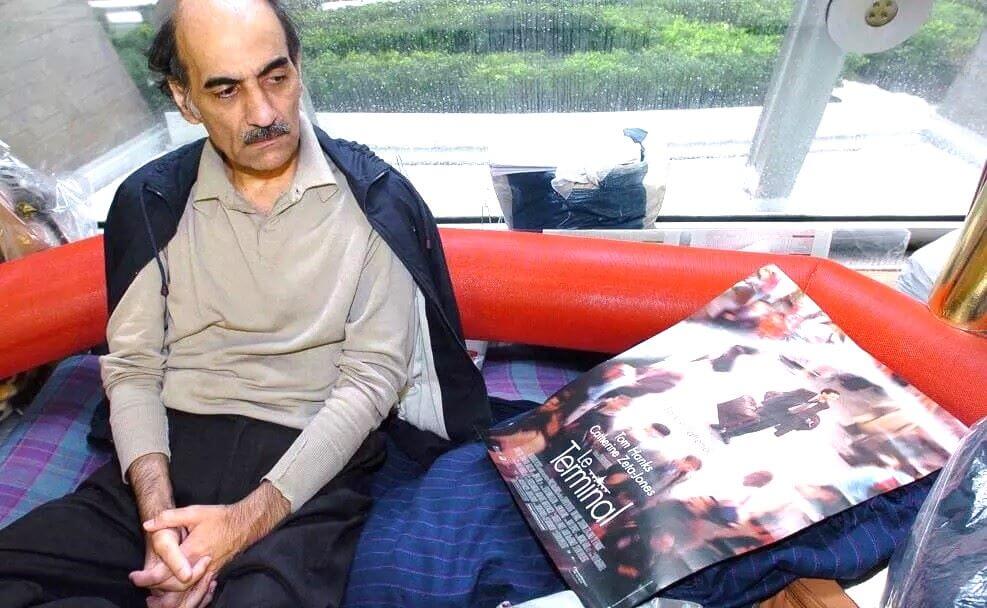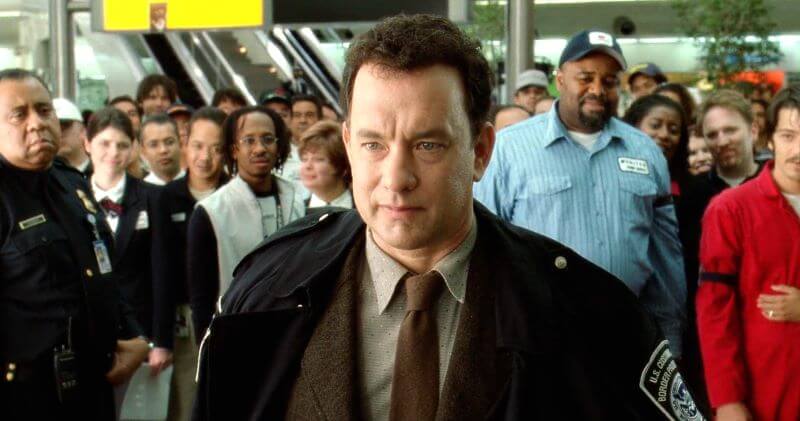Last updated on March 30th, 2023 at 03:50 pm
The Iranian man, Mehran Karimi Nasseri, who inspired the 2004 Hollywood film The Terminal and lived in the Charles de Gaulle Airport in France for 18 years because of legal complexities, and an additional 16 by choice, died November 13, 2022, from a heart attack at 77. Nasseri was prevented from boarding London-bound airlines for not having a valid passport in 1988 and since then began living in Terminal 1 of the airport.
According to The Guardian’s account, Nasseri was born in 1945 in Masjed Soleyman, the capital city of the Iranian Province Khuzestan. Before he left Tehran for England in 1974 to study he lives in Belgium and France. But during his three years of stay at the University of Bradford, he participated in a protest against the Shah Muhammad Reza Pahlavi which is why he was imprisoned and stripped of his citizenship and expelled in 1977.

In 1981 he was given refugee status by the Belgium UNHCR. He was able to travel to Britain and Paris without any difficulties unlit 1988 when he was arrested by the police with a one-way ticket to London and without a passport at Charles de Gaulle Airport. He said his refugee documents were stolen at the Paris train station.
However, after his father’s death at 23, his mother told him that she was not his real mother and he was a result of the affair between his father and a Scottish nurse, whom he tried to find out by travelling to Britain, and whom he believed to reside in Glasgow. He got rid of his identification papers onboard an England-bound boat in the belief he’d no longer need them and fell into a stateless quagmire.
Still, some say he left Iran willingly, some say he burned his Iranian identity and yet according to some he was truly expelled by the Iranian government.
He was sent back to Heathrow Airport in London, but the British Immigration official did not let him enter the country due to his lacking papers probing his nationality, and he returned to Charles de Gaulle. Police could not deport him because he could not prove his nationality and no country was ready to accept him. He eventually became trapped inside the airport; it became his home since then.
Mehran who wanted to be known as Sir Alfred wrote an autobiography which was published in 2004 under the title, The Terminal Man.
Nevertheless, in 1999 he was granted permission to leave the airport and travel anywhere in Europe. he did not want to go anywhere because, The Times quotes the airport physician, he was “scared to leave this bubble world” that he had been living in. He lived till his death at the airport. Mehran wan was not allowed in the airport after his hospitalisation due to his chest pain, though he returned in 2022 where breathed his last.
Accordingly, directed by Steven Spielberg, and starred by Tom Hanks and Catherine Zeta-Jones, the 2004 film The Terminal 2004 portrayed a man, Viktor Navosky, stranded in John F. Kenney airport because of his statelessness when his fictional country, Krakozhia, was grappled by a coup. Viktor was going to New York to meet, Benny Golson, a saxophone player in a jazz band, of whom his father was a big fan. Bound by a promise by his father, he decided to travel to New York with a can be filled with signed papers of 57 members of the jazz, except Benny Golson.
The Terminal 2004
At the John F. Kennedy airport, the United States government could not permit him to enter the US as his passport became invalid due to a coup d’état in his country Krakozhia and he will not get a visa until it recognises the new government. He becomes a refugee and was forced to live at the airport as the U.S. Customs and Border Protection seized his passport and the return ticket.
Viktor settles in at the terminal with only his luggage and a Planters peanut can. Soon he became a nuisance to the airport officials, especially to Frank Dixon, the acting Field Commissioner. Having no money, Viktor tried to get his meal by gathering carts, and carrying messages to a female immigration officer, Dolores, on behalf of Enrique Cruz, an airport employee who fell in love with her. And later, he was hired by the airport construction company because of his skill in construction. Dixon got jealous that he earned 19 $ an hour.

All the while, Dixon is intended to get Viktor out of the airport making him someone else’s problem, instead. He failed when he tried Viktor to leave the airport by luring him and ordering guards away from the exit door for five minutes. Dixon then tries to convince Viktor to claim asylum protection from the US movement by establishing a ‘credible fear’ of his homeland. He told him to talk about the fear that prevents him from returning to his country. Viktor refused to say annoying against his country.
Meanwhile, Viktor befriends several airport employees, Gupta, a janitor, Joe and Enrique Cruz, and most of all a frequent traveller and flight attendant named Amelia Warren, whom he starts seeing periodically and proposed to her to dine with him which his friends Gupta, Joe and Enrique arranged later on. In the meantime, Viktor begins reading books and magazines to learn English.
Dixon one day confronted Amelia about Viktor. He wanted to know if she knows what is it inside that mysterious peanut can. When asked by Amelia Viktor said that his late father was a jazz enthusiast who had discovered the famous portrait in a Hungarian newspaper in 1958 and vowed to collect the autographs of all 57 of the musicians featured on it. He died before he could get the last one, from tenor saxophonist Benny Golson. Viktor has come to New York to collect his sign. After hearing the story, Amelia kisses Viktor, however, he saw him leave her with her boyfriend, a married man for whom she travelled to New York so frequently.
After nine months of trapping, Viktor had the news that the war in Krakozhia had ended, and was happy to be able to travel to New York. Meanwhile, Amelia asked one of her friends to get Viktor a one-day emergency visa so he can go and meet Benny Golson to fulfil his promise to his father. But he was dismayed to know that in order to get an emergency visa he must have his paper signed by Dixon. Now that Krakozhia is stable and his passport has become valid, he determined to send Viktor to Krakozhia as soon as possible, while Viktor said will go to New York.
However, Dixon threatened him that if he refuses to go home at once he will cause trouble of being deported his airports friends—Gupta Rajan, the janitor, an absconder of charge for assaulting a police officer in India, newlywed Enrique Cruz might lose his job and Joe Mulroy might lose his pension because of his illegal activities in the airport. Considering their fate at stake, Viktor finally agreed to return home. When Gupta learns of this, he runs in front of the plane which would take Viktor back home, ensuring his deportation and taking the burden off Viktor. And the Flight to Krakozhia got delayed.
Because of the delay, Viktor had enough time to get into New York city and track down Benny Golson. Dixon orders his officers to arrest Viktor but disillusioned with Dixon, they let him leave the airport. Viktor reached New York at the hotel where Benny Golson was performing and finally collects his last autograph. He gets in a taxi, telling the driver, “I am going home”, afterwards.
What to Consider
Though funny and dramatic seems the portrayal of Nasseri’s life, The Terminal bears some important messages for me. I can only imagine how Nasseri really felt when there was no country to accept him. His own country where he grew up with grain in his mouth and where remained his family, disowned him just because of his different political ideology, exactly the way we sometimes disown our beloved country to be adopted by our desired countries.
I can only imagine the pain and desperation of Nasseri when you see thousands of travellers from different parts of the world and from different families gather at the airport in the morning and eventually disappear to their respective destinations, while he is the only one to live with silence, unsure of what brings tomorrow, where his next meal will come from. Expecting every moment is the last moment, keep hoping for the better. Nasseri lived the whole time on what the travellers offered him, for 34 years, or say 18 years.
He was so accustomed to his captivity and the limitation of movements and scarcity that Nasseri was afraid to venture out into the real world when permitted in 2006. After so many years inside, he found the external world shocking, bizarre, daunting and unexpected. Therefore, he lived the rest of his life inside that airport even when he was allowed to go out, I think this is what can be said as “Stockholm Syndrome.”
We are familiar with the same phenomenon called “institutionalizations” in The Shawshank Redemption where when after a long imprisonment Red was granted parole, he was unable to cope with the environment outside the prison, and nothing outside the prison made sense to him. And in All Quiet in the Western Front (1930), Paul Baumer encountered an unfamiliar situation when visited his family during his convalescence leave. Instead of being appreciated for his heroism, he was considered cowered for being alive.
Consequently, all he desired was to be on the front line, to kill or get killed. Victor Frankl talked about a similar psychological dilemma in his Man’s Search for Meaning. We suddenly become refugees in our own mind, to our own county we become unwanted or our own country becomes unwanted to us. One country’s citizens transform into refugees in other countries on various grounds: war, politics, ideology, religion, race or language. We, our existence become insignificant altogether.
According to Amnesty International, there are 26.3 million refugees globally including 1 million plus Rohingyas in Bangladesh. Every day, all over the world, people make one of the most difficult decisions in their lives: to leave their homes in search of a safer, better life.
Moreover, I am extremely shocked to hear that, apart from some extreme phenomena related to freedom of expression and freedom of thinking which led to the killing of some bloggers in recent years, many people with insignificant profiles and from religious and political minority groups do not hesitate to malign the image of the country in seeking asylum in foreign lands. All they expect is to leave the country by any means possible. Once reached the desired country, they threw away their passports or conceal them.
When apprehended, they tell the authority that their country is not safe for them or will face deadly consequences if extradited or deported. Thousands of people Bangladeshis are staying abroad on asylum privileges just for the wrong reason. The motherland that nurtured them, and educated them suddenly becomes a foreign land, an enemy to them. Governments come and go but they remain in those adopted countries as traitors, remain traitors.
If state-level infidelity of neglecting its citizens of their citizenry rights, then individual-level of infidelity against our motherland inflicts injuries to our very souls and conscience. There are numerous self-inflicted or state-made Nasseries around us, who are either victimised or in disguise of being victims to claim asylum in search of better living and a glossy lifestyle.
When Navorski was asked by CBP (the US Customs and Border Protection–Federal Agency) Field Commissioner, Frank Dixon, to give a credible fear, a fear for which he is afraid to return to Krakozhia, he replied, “Is (Krakozhia) home. I am not, afraid from my home.”
According to US Citizenship and Immigration Service’s Annual Statistical Report FY 2021, “Credible fear screenings apply to individuals in expedited removal proceedings who indicate an intention to apply for asylum, a fear of persecution or torture, or a fear of return to their home country are screened to determine whether there is a significant possibility that the individual could establish eligibility for asylum or withholding of removal or a significant possibility he or she is eligible for protection under the regulations implementing the Convention Against Torture.”
He said, if they can establish this fear with him, then the CBP will be forced to begin Expedited Removal Procedures, to bring him to an immigration judge and let him plead his case for asylum. Viktor denied having that privilege by inflicting harm on his country.
Even though the country was in great turmoil, a shortage of food; the country that rendered him stateless. He did not agree to seek asylum by maligning his country’s image which he could have easily done. In contrast, we are ready to divorce our motherland at any moment for sake of living in a rich country. Although their dream of living in a dream country becomes reality, the wound in their heart does not get healed easily.
The United States grants asylum privileges based on one’s suffering or persecution due to, race, religion, nationality, membership in a particular social group, or political opinion.
According to UNHCR’s Asylum Trends 2014 review, Germany is the largest single asylum recipient country among the 44 industrialised countries. It registered 173,100 new asylum applications in the year of 2014. And with an estimation of 121,200 asylum seeker applications, the United State became the second largest country among the 44 industrialised nations. With 87,800 by Turkey, 75,100 by Sweden and 63, 700 by Italy the nations were followed by consecutively. The top five receiving countries together accounted for six out of ten new asylum claims submitted in the 44 industrialized countries.
However, the number of Bangladeshi asylum seekers in 44 industrialized nations increased to 12,805 in 2014 from 9342 in 2013, placing the country in the 17th position in the rank. Asylum applications in European nations increased from 8,239 in 2013 to 10,713 in 2014, moving the country up to 16th place on the list. However, a national daily reports citing the UNHCR review that, 160,737 people sought asylum in five years due to repressive political culture, and violation of basic civil and political rights.
16,550 Stateless individuals submitted for asylum claims. Additionally, more than half of the 40 nations included are a majority of Muslims. The top five countries from which asylum seekers came to the 44 industrialized nations in 2014 were the Syrian Arab Republic, Iraq, Afghanistan, Serbia and Kosovo, and Eritrea.
Coming back to The Terminal, when Dixon decided to let Viktor go, he talked about the rationale behind it to his colleague, “Catch and release. It’s simple. Sometimes you land a small fish. You unhook him and place him back in the water. You set him free so that somebody else can have the pleasure of catching him.” Here in the real world, the people who are victims of legal predicaments are the playthings of the law enforcers. Only hands change over time while sufferers remain the same.






